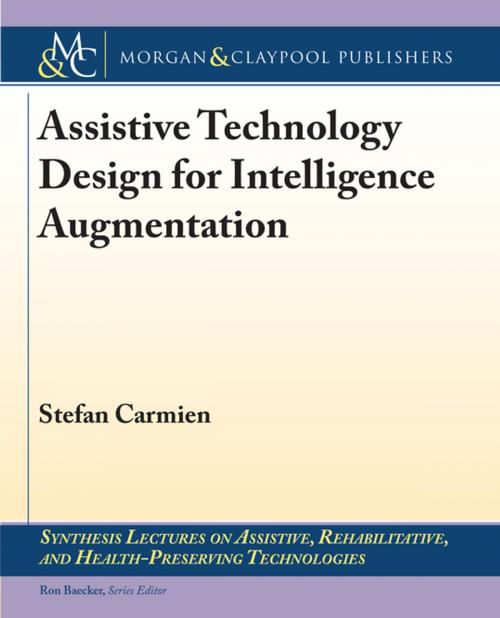Assistive Technology Design for Intelligence Augmentation
Nonfiction, Computers, Advanced Computing, Programming, User Interfaces, Artificial Intelligence| Author: | Stefan Carmien | ISBN: | 9781627057967 |
| Publisher: | Morgan & Claypool Publishers | Publication: | April 4, 2016 |
| Imprint: | Morgan & Claypool Publishers | Language: | English |
| Author: | Stefan Carmien |
| ISBN: | 9781627057967 |
| Publisher: | Morgan & Claypool Publishers |
| Publication: | April 4, 2016 |
| Imprint: | Morgan & Claypool Publishers |
| Language: | English |
Assistive Technology Design for Intelligence Augmentation presents a series of frameworks, perspectives, and design guidelines drawn from disciplines spanning urban design, artificial intelligence, sociology, and new forms of collaborative work, as well as the author's experience in designing systems for people with cognitive disabilities. Many of the topics explored came from the author's graduate studies at the Center for LifeLong Learning and Design, part of the Department of Computer Science and the Institute of Cognitive Science at the University of Colorado, Boulder. The members of the Center for LifeLong Learning and Design came from a wide range of design perspectives including computer science, molecular biology, journalism, architecture, assistive technology (AT), urban design, sociology, and psychology. The main emphasis of this book is to provide leverage for understanding the problems that the AT designer faces rather than facilitating the design process itself. Looking at the designer's task with these lenses often changes the nature of the problem to be solved. The main body of this book consists of a series of short chapters describing a particular approach, its applicability and relevance to design for intelligence augmentation in complex computationally supported systems, and examples in research and the marketplace. The final part of the book consists of listing source documents for each of the topics and a reading list for further exploration. This book provides an introduction to perspectives and frameworks that are not commonly taught in presentations of AT design which may also provide valuable design insights to general human-computer interaction and computer-supported cooperative work researchers and practitioners.
Assistive Technology Design for Intelligence Augmentation presents a series of frameworks, perspectives, and design guidelines drawn from disciplines spanning urban design, artificial intelligence, sociology, and new forms of collaborative work, as well as the author's experience in designing systems for people with cognitive disabilities. Many of the topics explored came from the author's graduate studies at the Center for LifeLong Learning and Design, part of the Department of Computer Science and the Institute of Cognitive Science at the University of Colorado, Boulder. The members of the Center for LifeLong Learning and Design came from a wide range of design perspectives including computer science, molecular biology, journalism, architecture, assistive technology (AT), urban design, sociology, and psychology. The main emphasis of this book is to provide leverage for understanding the problems that the AT designer faces rather than facilitating the design process itself. Looking at the designer's task with these lenses often changes the nature of the problem to be solved. The main body of this book consists of a series of short chapters describing a particular approach, its applicability and relevance to design for intelligence augmentation in complex computationally supported systems, and examples in research and the marketplace. The final part of the book consists of listing source documents for each of the topics and a reading list for further exploration. This book provides an introduction to perspectives and frameworks that are not commonly taught in presentations of AT design which may also provide valuable design insights to general human-computer interaction and computer-supported cooperative work researchers and practitioners.















